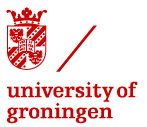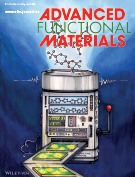
Front cover
May 23, 2018
Our research features the front cover of Advanced Functional Materials
In article number 1800116, Sergei A. Ponomarenko, Maxim S. Pshenichnikov, Dmitry Yu. Paraschuk, and co-workers propose an innovative concept of molecular self‐doping. The art shows how a highly luminescent dopant emerges as a minute‐amount by-product during the host material synthesis to enhance luminescence of organic crystals. The self-doping concept opens an easy route to highly luminescent semiconductor organic crystals for optoelectronics applications
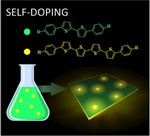
Molecular Self-Doping Controls Luminescence of Pure Organic Single Crystals
March 14, 2018
Modern light-emitting devices such as top-level TV screens are based on organic luminescent semiconductor materials. The two key requirements for them are efficient luminescence and high charge carrier mobility. The latter requires tight molecular packing readily achieved in organic semiconductor single crystals, but it also results in inhibiting the light emission because of luminescence quenching. This dichotomy is resolved by doping of the host crystals with highly luminescent organic molecules which requires their chemical synthesis and subsequent smooth embedding into the host.
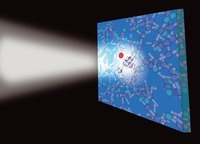
Our research features the backcover of PCCP
November 6, 2017
Showcasing research from the group of Dr Maxim S. Pshenichnikov and Dr. Thomas Lacour Jansen at the Zernike Institute for Advanced Materials, University of Groningen, The Netherlands
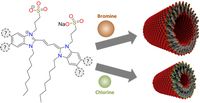
Smart Molecules Modify Nanotube Morphology
June 14, 2017
Natural photosynthetic complexes have evolved to successfully operate under extreme low light conditions. Their tubular structure inspired the scientists to mimic nature with artificial nanotubes made of smart molecules, which are “programmed” to self-assemble in tubes without any human intervention. Changing the nanotubes sizes, which is of great interest for potential applications, requires re-programming the molecules.

Organized but Intermittent: a liquid mimicking disordered proteins
May 19, 2017
Proteins, the engines of life, form the basis for all vital functions in all living systems. Most commonly, the biological functions of the proteins are imposed by their well-defined structures. This is not the case, however, for the so-called intrinsically disordered proteins (IDP), which e.g. are involved in DNA repair. In IDPs, the structural motifs are labile, rapidly fluctuating between conformations, which makes them very challenging to study.

